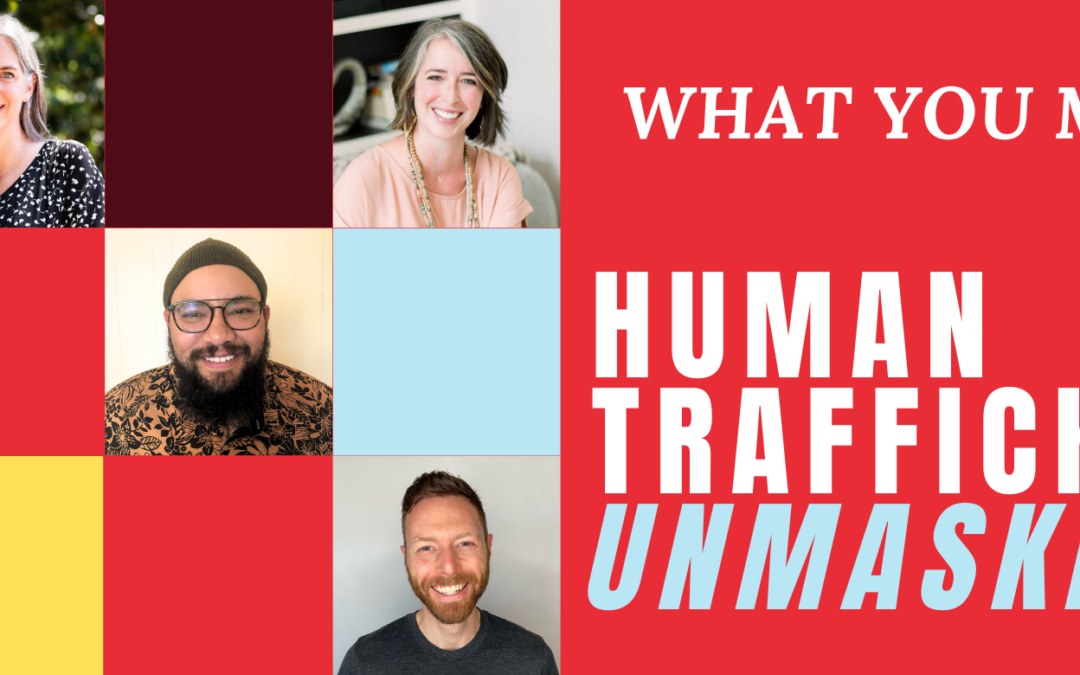Recently we hosted an enlightening panel discussion on the pressing issue of human trafficking and how each of us can take a stand toward prevention.
As one attendee shared about what was most meaningful about the event,
“I just loved the various perspectives on exploitation that helped me see it in more of a total view. I was really not expecting that, and honestly, I have a lot to think about after tonight.”
You can now watch the entire panel discussion by following this link: https://youtu.be/T_s3-SlGoeo
We’ve also summarized some key points from each of the panelists down below.
Audrey Moore | Lift Up the Vulnerable [3:29]
- Human Trafficking is the exploitation of vulnerabilities. [4:17]
- 1 in every 150 people alive are trapped in forced labor or forced marriages – and of these numbers, 12% are children. [6:32]
- Labor trafficking is so pervasive, it is very hard to find products or services that aren’t using a forced workforce or children. [6:58]
- At Lift Up the Vulnerable, we want to prevent human trafficking – we are in places where women and children are the most vulnerable and little to no help is available. [10:19]
- Our approach is addressing the complex issues of extreme poverty, instability, and lack of infrastructure and resources which led us to Sudan and South Sudan. [13:18]
Bryan Pride | Rise Against Hunger [15:32]
- Food security plays a role in preventing trafficking. [17:13]
- In Sudan and South Sudan, it was believed that farming was not possible – that the soil in South Sudan was not fertile therefore they would always be reliant on food assistance. [18:58]
- “Conflict in South Sudan actually starts in peoples’ stomachs”. [20:11]
- Together, Lift Up the Vulnerable and Rise Against Hunger, are empowering communities to grow their own food as a means to try to end this conflict. [23:00]
- We have been able to establish farms and now instead of 100% of food being imported (at Hope For South Sudan), only 25% of food needs to be imported. 75% of food is cultivated on campus. [24:00]
Erik Olson | Dignity Coconuts [25:59]
- When asking some farmers in the Philippines what their biggest hopes and dreams were – one answer shocked Erik “My hope is that my debt is not passed onto my children”. [29:27]
- Farmers were being exploited for their coconuts – they were not being paid enough causing them to go deeper and deeper into debt which results in labor trafficking or sex trafficking. [30:17]
- This economic problem needs an economic solution, so Erik helped build a business with the heart of a non-profit called Dignity Coconuts – making raw coconut oil that stops trafficking. [31:28]
- Our goal is to first help the farmers, getting fair trade for their coconuts, and then to create jobs within the community and lastly, we want to empower them with education. [31:42]
- Why? Because this keeps families together and restores their dignity. [32:19]
Wellon Bridgers | Mwana Villages [35:16]
- For countries who operate in survival mode, adoption is a way to bring in money. [38:00]
- When money is tied to adoption, there is always an incentive for the child to be adopted whether or not it’s in the child’s best interest. [38:30]
- Wellon and her husband went to go adopt a child but when they asked hard questions, they discovered that the child did have parents and so they called off the adoption. [39:12]
- So, we wanted to know if there are places that try to keep families together first? [40:45]
- At Mwana Villages, the priority is keeping families together and adoption only when needed. [41:13]

